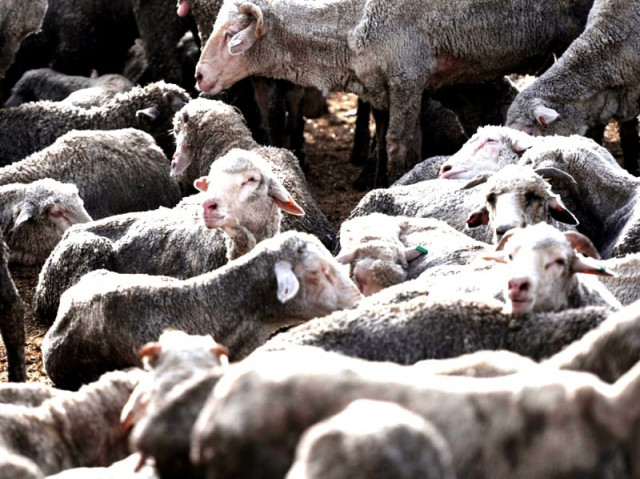Contradictory lab reports: Questions unanswered as SHC halts sheep cull
Mystery surrounds Bahrain’s initial rejection of the livestock import.

For now, the imported Australian sheep are safe. The high court has stayed any more culling until they are tested afresh and that too from Islamabad – although the question of why the sheep were rejected by Bahrain in the first place remains unanswered.
The order came on the petition filed by the owner of PK Livestock and Meat Tariq Mehmood Butt, who purchased the animals and had gone to the Sindh High Court seeking a restraining order against the culling of 21,000 ‘infected’ sheep ordered by the Karachi Municipal Corporation.
On Tuesday, the bench formed a committee led by the livestock secretary to have the sheep diagnosed and submit the report within a week.
“When the animals were offloaded at the Karachi port, the authorities collected samples to get them tested for scabby mouth disease without any permission,” he alleged. An Islamabad-based research and safety laboratory had already declared all sheep disease-free, but the Sindh government got them tested at a veterinary laboratory in Tandojam, which reported them to be infected.
More than 1,500 sheep have been culled and buried at the owner’s farm near Razzaqabad in Karachi.
“As healthy animals are being culled, it may lead to a ban on meat export from Pakistan, and may also harm bilateral ties with Australia,” argued the petitioner.
Meanwhile, a spokesperson for the Australian Department of Agriculture, Fisheries and Forestry said the World Organisation for Animal Health regarded scabby mouth as a common and minor disease. “There is no risk to human health from eating animals with scabby mouth,” it said in a statement emailed to The Express Tribune.
The Bahraini mystery
ABC News, an Australian news network, had reported earlier that the ship carrying the sheep from the Australian company Wellard Rural Exports reached Karachi after Bahrain refused to accept the livestock because of concerns over their fitness.
However, Wellard Group Holdings Executive Director Stephen Meerwald refuted the claim on Tuesday and told The Express Tribune that the Bahrain government had issued a document to his company “confirming that the livestock can be discharged.”
In contrast, spokesperson for Wellard Rural Exports Cameron Morse said the company did not know the reason why Bahrain turned down the livestock. “We have received little official advice on why the cargo was rejected. Nor (did we have) access to any official result of various tests undertaken,” Morse told The Express Tribune. “The vessel was ordered out of the port by the (Bahraini) interior minister. So we had no other alternative than to look for another market.”
The Bahraini consulate in Karachi did not respond to the queries of The Express Tribune until the filing of this report.
A PR disaster?
“Pakistan was a fast-tracked ‘solution’ for an exporter desperate to avoid a PR disaster when this shipment of sheep was rejected by Bahrain,” said Lyn White, campaign director for Animals Australia, an NGO that played a key role in exposing slaughter practices of Australian-exported cattle in Indonesia last year. Its campaign led to the introduction of Exporters Supply Chain Assurance System (ESCAS) – a regulatory framework that requires Australian exporters to implement approved supply chains in countries that would restrict animals to certain feedlots and abattoirs that met base-level international standards before an export permit could be approved to that country.
White told The Express Tribune that supply chain approval in Pakistan under the ESCAS was fast-tracked to provide an option for the sheep that were rejected by Bahrain. “There is so much public opposition to the live export trade in Australia that having a ship floating without a destination was a potential PR disaster for the industry,” she said.
In its official statement emailed to The Express Tribune, the spokesperson for the Australian Department of Agriculture, Fisheries and Forestry acknowledged that the shipment to Pakistan was allowed once the department approved a ‘variation’ to the ESCAS.
According to The Australian, one of the country’s national newspapers, PK Livestock and Meat bought the shipment at a reported value of Rs130 million. Despite repeated attempts, no representative from PK Livestock and Meat was available for comment on Tuesday.
(WITH ADDITIONAL INPUT FROM PPI)
Published in The Express Tribune, September 19th, 2012.



1724319076-0/Untitled-design-(5)1724319076-0-208x130.webp)















COMMENTS
Comments are moderated and generally will be posted if they are on-topic and not abusive.
For more information, please see our Comments FAQ